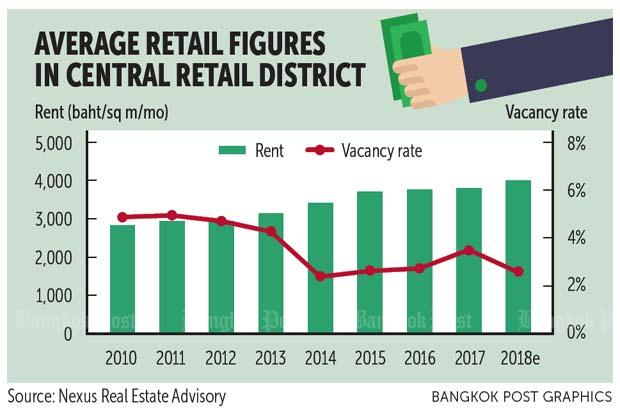Thailand-Nexus: Maturing retail market should embrace 24/7 service
The retail sector is one of the most sophisticated real estate markets in Thailand. Retailing has expanded rapidly and aggressively here in recent years, even as shopping malls in many countries have been walloped by online shopping and dramatic changes in consumer behaviour.
The retail market in Thailand continues to grow, with Bangkok leading the way. New retail developments, large and small, open each year.
The most recent wave of malls was sparked when Siam Paragon opened in late 2005, followed by several luxury malls in the Phloenchit-Sukhumvit corridor.
The retail market in Bangkok has been highly competitive, especially in prime areas. The vacancy rate is lower than 5%, and rental rates are increasing sharply as tenants line up for available space.
Social media such as Facebook and Instagram have driven a boom in food and drink, with many international and local brands testing the market. Tourist arrivals have also boosted the retail sector, with sales growth of 11.7% last year, according to the Tourism and Sports Ministry.
The newest supply in Bangkok’s central retail district (CRD) was Gaysorn Tower. The net lettable area is 10,000 square metres, which brought total supply in the CRD to 660,000 sq m. The occupancy rate in the CRD is 96.4%.
New supply in the CRD will run up against the limiting effect of dramatically increasing land prices. Future supply will increasingly emerge on the outskirts of the capital.
Meanwhile, consumer behaviour is changing. Many retail operators are considering staying open 24 hours, and some already do.
“There are a lot of inquiries about 24-hours business, such as coffee shops, restaurants, co-working spaces and lifestyle entertainment,” said Teerawit Limthongsakul, managing director of Nexus Real Estate Advisory. “I find it an interesting opportunity for any business to operate 24/7. The retail market won’t be the same. It will be more accessible and lively.”
Lifestyle platforms have changed, technology is now the norm, and health and wellness is a trend, particularly among the young.
“We see that fitness is almost everywhere, especially in residential projects, shopping malls and community malls,” Mr Teerawit said. “The fitness business has done well in the past decade, with many well-known brands stabilising and continuing to grow. But most of the international brands are targeting the high-end segment. The collapse of big-brand fitness centres during the past few years left a huge hole in the middle segment.”
At least three international fitness brands with 24/7 operations arrived in Thailand at the same time. They hunted for ground-floor spaces to provide convenience to customers, but some landlords weren’t keen on the idea.
“It will take time to change the perspective of landlords to see that fitness can be an anchor and a magnet like Starbucks or McDonald’s,” Mr Teerawit said.
Source: https://www.bangkokpost.com/business/news/1518398/nexus-maturing-retail-market-should-embrace-24-7-service


 English
English




